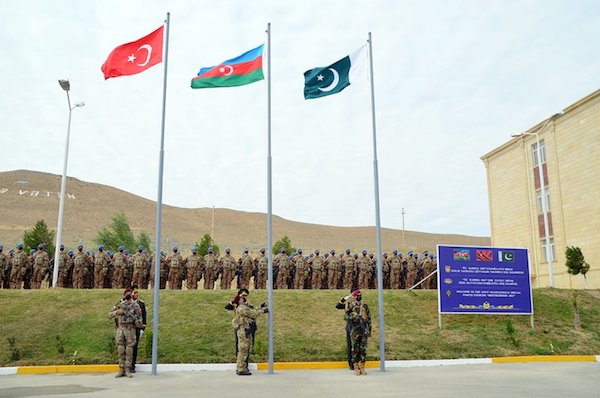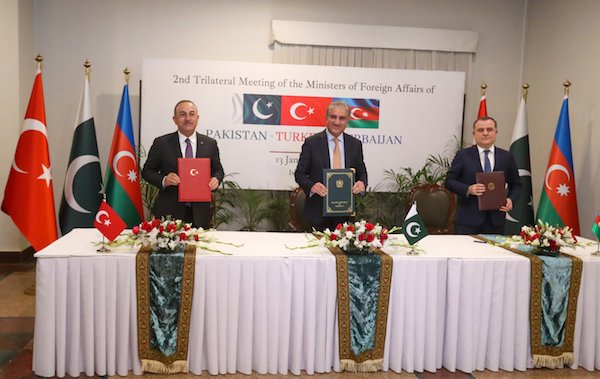The emerging trilateral cooperative interaction between three Muslim nations has communicated to the world at large the strengthening of Islamabad’s role in maintaining cooperative relations with the Islamic world, where Pakistan has always strived to consolidate the potential of Muslim countries. The objective of enhancing its position in the Muslim world moved Pakistani leaders to explore potential avenues of trilateral cooperation with Azerbaijan and Turkey. In addition to accepting each other in a trilateral cooperative arrangement, the governments of these three Muslim nations also agreed on diversifying their ties in different dimensions. The agreed framework between Islamabad, Baku and Ankara let them to support each other in their national security issues. A recent trilateral meeting between the foreign ministers of three countries can be considered a brief reflection of their determination in deepening ties with active bilateral associations in different fields. The combination of bilateral and tripartite interactions is believed to be an appropriate mechanism for boosting their politically cooperative, diplomatically supportive, and economically collaborative relations.
The agreed framework was initially formalized in the Baku Declaration, which was intended to enhance cooperation in all areas of mutual interest. The first trilateral cooperation meeting was held in Azerbaijan on November 30, 2017, where the foreign ministers decided to cooperate in strategic and security affairs. Additionally, the leaders of the three nations planned to cover the areas of economic and trade, peace and security as well as science and technology. The Baku Declaration exclusively emphasized upon the enhancement of trilateral social and cultural contacts. The representatives of these Muslim nations decided to uphold their visions of promoting peace, stability and development in their respective regions. The trilateral framework agreement emphasized the promotion of people-to-people contacts at the societal level to promote common ideas of peace and prosperity. In the continuation of the smooth functioning of their shared approach towards various developments of global power politics, Pakistani, Azeri, and Turkish governments arranged the second round of trilateral meetings in Islamabad on January 13, 2021, where the foreign ministers planned to work on common ideological grounds. By exclusively focusing on the shared vision of Islam, the second round of trilateral dialogue focused on the formulation of joint efforts in combating Islamophobia, along with discrimination and persecution of Muslim minorities across the globe. Moreover, the representatives of these governments expressed their deep concerns over the grave human rights abuses and the violations of fundamental human rights of the Muslim communities living under different political administrations in the world. The focus on creating a common stance on the crimes against humanity and its direction towards particular Muslim communities validated the ideological foundations of trilateral alliance in the international system. In short, both meetings set the grounds for an all new format of tripartite diplomatic coordination and political cooperation. The fundamental purpose of creating this trilateral cooperation is to foster inter-parliamentary dialogues between the representatives of three countries, which will empower their governments to increase their bilateral interactions.

Apart from exploring different avenues of business and trade under the larger rubric of economic cooperation, the leaders of the three nations developed a consensus to dwell upon their common grounds for cooperation beyond financial matters. The quest for expanding their trilateral communication in several other dimensions led Pakistani, Azeri, and Turkish governments to formulate common grounds for effective three dimensional strategic coordination. The ‘Three Brothers – 2021’ military exercise is an appropriate example because the three governments are willing to address threats of transnational and hybrid in nature. The military drill between the Special Forces from Islamabad, Baku, and Ankara was conducted in Azerbaijan (between 12-20 September 2021) to introduce a joint force integration mechanism between the three forces. The nine-day exercise was primarily designed to improve their combat interoperability along with upgrading their wartime and peacetime operation preparations. An increased communication mechanism between the three forces allowed them exchange knowledge and experience of war-fighting capabilities. The arrangement of a military drill in Azerbaijan was a great symbolic reflection of two Muslim countries’ support to Baku in its region and broadly considered to be massive support of Azerbaijan on its territorial clash with Armenia. In other words, the Turkish and Pakistani governments reaffirmed their support to Azerbaijan’s position on the Nagorno Karabakh issue against Armenia. In this way, the leaders of the three countries initiated a process of deepening trilateral cooperative interaction in military terms. The strengthening of military relations in the form of a joint exercise has further communicated their potential against the common threats of terrorism; that’s why the main agenda of this military drill focused on anti-terrorist operations. Through learning the best practices of counter-terrorism, the three nations advanced war-fighting capabilities and communicated their combined practical measures to address future security challenges to the international community.

The recent meeting hosted by Pakistan issued a joint communiqué based on Islamabad’s efforts for building an alliance between three friendly countries backed by their close bilateral ties. The leaders of the three nations concentrated their combined vision of functionalizing joint cooperative mechanisms to counter the potential challenges in their respective regions. The conduct of a military exercise and the signing of various cooperative associations spawned a new debate in the international system, the joint military drills have drawn the attention of global leaders towards the emerging alliance. Critical circles of the international community have started expressing their concerns on the growing alliance of Islamabad-Baku-Ankara. All three governments have started facing various levels of critical analysis in their respective regions where their neighbouring nations are trying to understand the nature of the trilateral alliance. The shared efforts at bilateral levels have already proven them to be reliable partners and collaborators in different fields. The military dimension of this trilateral alliance has been observed as an initial roadmap for further strengthening of existing ties between armies which could allow the armed forces of three states to avail substantial opportunities in the fields of security and defence.
In the debate of evolving trilateral multidimensional partnership between Azerbaijan and Turkey, the active role of Pakistan cannot be marginalized because Islamabad has already worked a lot for the restoration of peace in its home region. The history of South Asia is full of incidents where Pakistani leaders offered various peaceful moves in the South Asian region. Additionally, a brief list of Pakistan-specific initiatives for the consolidation of the potential of the Muslim world offers more legitimacy to Islamabad’s dynamic approach for strengthening the cooperative bonds between Baku and Ankara. Furthermore, the support of two great nations of the Islamic world has become an opposite opportunity for Islamabad in enhancing its vision of peace in South Asian regional affairs, Pakistan’s leaders are now able to increase their multidimensional ties with like-minded Muslim nations. The exploration of Azeri and Turkish support is an appreciable achievement of Pakistan’s foreign policy, which could facilitate Islamabad to empower its role in regional and extra-regional affairs. An improved position at the regional and international levels will let Islamabad explore more avenues for multilateral collaboration in the Muslim world.





